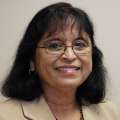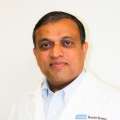A petting zoo. A jumper. A magician making balloon animals. Bluey, star of the popular children’s TV show, posing for photos. Hamburgers, chips and a chocolate fountain. Plenty of smiling kids running around in the sunshine. Happy parents.
In many ways, the Oct. 13 event on the UCLA campus was like any other top-notch kids’ party. Only here, gratitude was front and center – this was a reunion of families whose children started their lives in the UCLA Mattel Children’s Hospital neonatal intensive care unit (NICU).
“The NICU reunion is an incredibly important event that helps families heal and overcome what they experienced in the past with their ill children and gives them a chance to interact with the caregiving team and express their gratitude,” says , executive chair of the Department of Pediatrics at UCLA Health and physician in chief at UCLA Mattel Children’s Hospital. “For the caregiving team, it affirms what they do day in and day out and allows them to connect with families again and hear about their journeys beyond the NICU.”
The NICU reunion has been held biennially for more than 40 years. The most recent event – the first in-person gathering since the COVID-19 pandemic – drew 450 former patients, ranging in age from 3 months to 31 years old. It’s an inspiring day for patients, families and health care providers, Dr. Devaskar says.
Meet a few of the guests, in their own words:
Erin Copen Howard and son, JJ, age 9
I knew ahead of time that he was going to have complications, because he had a congenital diaphragmatic hernia, or CDH for short, and it’s a hole in the diaphragm. On the 20-week anatomy scan, they could see that. I was at a different hospital at the time, and they said, ‘You’re going to have to switch to UCLA. They’ll be able to care for him.’
When he was born in November of 2014, they had to put him on ECMO life support (a machine that takes over for the heart and lungs), which they said they would only do if there was a chance that he could survive. He was on ECMO for 15 days and then they did several surgeries. We were in the NICU for 101 days total before he went home.

He’s breathing just fine now. He’ll have lifelong complications, he’s autistic, he has ADHD, and he’s very medically fragile… . But the good news is that he’s alive and also that he is thriving. He’s an absolute genius. He’s been doing trigonometry since he was 6. He was doing jigsaw puzzles when he was 2, and as my first, I thought that’s just what kids do. He’s been tested and he’s profoundly gifted, especially in math and engineering and STEM kind of stuff. If you talk to him, it’s like you’re talking to a little Bill Gates.
The experience of being in the NICU is very isolating, because you don’t understand what could happen – the unknowns are really, really scary. And the reunion reminds us that we’re part of this larger community of families and staff who really and truly understand what we had to face, and what we continue to face. To me, it’s just all about community.
And the whole thank-you part of it. The staff there, the doctors and nurses, were like a family to us. What’s so great is just being there to thank them, because they didn’t just medically provide and save JJ’s life, but they emotionally supported me through this time of uncertainty. So the reunion gives me a chance to reconnect with those familiar faces and show them how far we’ve come. And to take a bragging moment and be like, ‘Look, it’s JJ! And he’s doing great.’
Stephanie Crisostomo and daughter Willow, age 10
She was 22 weeks and 4 days old when she was born. She was that early. She was 14 ounces and 10½ inches. She was the size of a kitten. She was born in Bakersfield, where we live. Our neonatologist there helped resuscitate Willow. She was kind of stabilized until we got to six weeks, when she needed a heart procedure, a ligation, done, so we transferred to UCLA.
The night we drove down, it was an emergency. They were life-flighting her there. And as soon as we got there, it was the middle of the night, and one of the fellows … she was so wonderful. She sat down in the parent room and went through every system of her body and what they were going to address. And while it was hard to hear, it was invaluable for us to have someone sit down and take the time to explain everything that they saw going on with Willow. I didn’t get to hold her until she was 2 months old.

She was given a 2% chance of survival at birth. Now she’s almost 11 years old. She’s obviously surviving and well and healthy, but we have seen some cognitive delays. It takes her a little longer to understand some things, but she gets it eventually, so we’re really encouraged by that. We are just in the process, still, forever, of discovering who she is, who God made her to be and how we can best support her.
Our faith has a very big role in our story. We believe God healed her and used the people at UCLA in doing so. So to be able to come back to a NICU reunion, we were kind of joking that it’s like our holy show-and-tell. Just to be able to show these professionals that what you do matters so much, to be able to come back and say, ‘Look, you don’t often get to see the result of your work, but here she is – she is a result of God using you to help with her treatment and get her healed and healthy.’
Rebecca Amrany, RN, a NICU nurse since 2013
I know I will come to every reunion going forward, because it's just such a heartwarming experience to see everybody again, and just to see everybody in a happier environment outside of the hospital.
It’s kind of astonishing – some people will come back years later and really remember you as making a big impact on their experience and leaving them with actually a good experience, even though having a sick child is one of the worst experiences any parent could have. Being one of the positive parts of having to go through that is extremely rewarding and I honestly just feel very grateful to be part of their journey. It humbles me. I just love my job so much because it's rewarding on so many levels, but especially getting to see everybody growing up and thriving and doing well. It’s just a very, very amazing experience.

I’ve even had families that were from so long ago and they’ll come up to you and say, ‘I just wanted to say you were my favorite nurse and I’ll never forget your kindness and your patience.” And you’re just thinking, ‘Oh my God, I didn’t even realize I did that for them, that I could be that light for them during such a hard time.’ And then just seeing their kids having fun and being kids and not being, you know, a sick kid.
It’s really a very therapeutic relationship, because it goes both ways. We help them, but they help us, too. They humble us. They remind us of what it is to be human, what it is to be a parent, what it is to care for people who are vulnerable and what a rewarding experience it is to do that. We all feel so privileged to be part of that journey for them.





